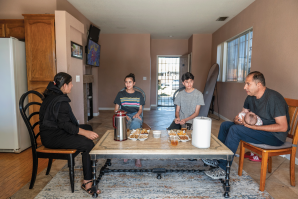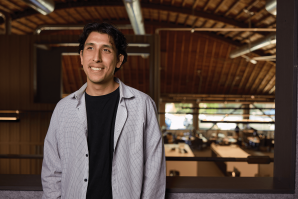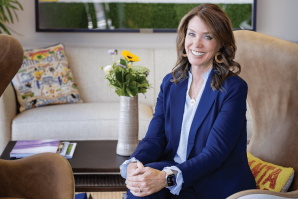The Capital Region has seen a stunning metamorphosis over the
past decade. You can say it began with the Golden 1 Center, which
brought in new businesses that transformed the Downtown Commons
into a gathering place. Once the home of just one major league
sports team, we now enjoy soccer under the summer sky and, soon,
major league baseball along with world-class concert events that
draw people from around the U.S. We’ve also watched our skyline
change, welcomed beautiful new living spaces and seen major
corporations move in.
These changes didn’t happen on their own; they occurred due to
the work and vision of a range of notable people, from developers
and public officials to sports executives and innovators. Here
are 13 people, chosen by Comstock’s editors and its advisory
board, in no particular order, who have impacted our region in
the past 10 years.
Sotiris Kolokotronis
Founder and president of SKK Developments
Cuban cigar boxes, from brands like Cohiba and Partagás, are stacked in a corner of the conference room at SKK Developments. Kolokotronis has been to Cuba before, he tells Comstock’s. He likens the feeling of being in Havana, where he went on a group visit, to being at Universal Studios and seeing what appears to be from a film but is real.
“You realize that nothing has happened in the last 65 years, of the decay of the buildings, the systems,” Kolokotronis says. “The last few years, they started refurbishing, redoing some here and there. But it is very, very sad.”
Such is the opposite of how Kolokotronis does things as a prolific infill developer. Whether it’s transforming the former Sacramento Bee parking garage into The Press at Midtown Quarter or leveling a former hotel across from the Governor’s Mansion to build The Mansion Apartments, Kolokotronis isn’t afraid to usher in the next chapter for land parcels.
“You cannot be afraid of change,” he says.
Born in Greece, Kolokotronis came to America to attend UC Berkeley. Thereafter, he went to work for his uncle Angelo Tsakopoulos, helping develop Laguna Creek. Kolokotronis got into infill after working in Portland in the 1990s and noticing a trend of cities rediscovering their urban cores. “Sacramento was really behind in that process,” Kolokotronis says.
After returning to the region, Kolokotronis developed The Fremont apartment homes near 15th and Q streets around the early 2000s. The Great Recession slowed some plans, but the rest, as the saying goes, is history.
With three of his adult children, Marisa, Nicholas and Constantine, now working in his business, the prospect of working less and traveling more beckons Kolokotronis. Still, he doesn’t want to step away entirely.
“I want to work less, but I don’t want to retire my brain,” he says.
Denton Kelley and Larry Kelley
Managing principal of LDK Ventures and the firm’s founder and chairman, respectively
For the third time since the late 1980s, the Kelley family is bringing a major project to fruition in the Sacramento region.
After developing Stanford Ranch in Rocklin and McClellan Park business center near North Highlands, the Kelleys are handling the largest infill project west of the Mississippi River: the 240-acre railyards, which could double downtown Sacramento and add approximately 10,000 housing units.
Denton Kelley, 48, managing principal of LDK Ventures (and a Comstock’s board member), says during an interview at the McClellan Park headquarters that his company has been involved in The Railyards for close to 10 years and has accomplished much to make the project shovel-ready. This has included planning and infrastructure work.
“You can’t always see the progress, even though there’s a lot of progress being made behind the scenes,” he says.
That helped bring a project that sat dormant for decades prior to LDK’s involvement much closer to reality. In recent years, buildings have finally started to come up out of the ground at The Railyards, with construction underway on roughly 495 residential units and a new California Superior Court house. Construction could start on a new Kaiser Permanente hospital in early 2025.
About 15 minutes into the interview, Denton’s father Larry Kelley, 79, who is founder and chairman of LDK Ventures and now serves as its chairman, pops his head in. He acknowledges that his past successes with Stanford Ranch and McClellan Park helped motivate him to get involved with The Railyards.
“We viewed it as a big opportunity for the whole community,” Larry Kelley says.
Full buildout of The Railyards might take another 15-20 years, with Denton Kelley saying, “We’ve scratched the surface.”
Still, even these few scratches offer tantalizing clues at what’s to come.
Vivek Ranadivé
Owner of the Sacramento Kings and Sacramento River Cats
Vivek Ranadivé was doing fine as a minority owner and vice chairman of the Golden State Warriors when then-NBA Commissioner David Stern approached him about buying the Kings.
At the time, around the spring of 2013, the Kings looked destined to move to Seattle. Ranadivé, who came to America from his native India to attend college, had become a successful technology executive with his company TIBCO.
“I came to this country as an immigrant, and I came to California with nothing in my pocket,” Ranadivé tells Comstock’s during a phone interview in early June. “Sacramento is our state capital. And without the team, the city really would have nothing — it would be like ripping the heart out of the city. And so maybe I was meant to do this as an immigrant.”
Ranadivé helped solidify the Kings staying in Sacramento. So much has happened since.
His impacts over the past decade include overseeing Golden 1 Center’s construction, purchasing the Sacramento River Cats in 2022 and agreeing earlier this year to let the Oakland A’s play at Sutter Health Park for three seasons ahead of the team’s move to Las Vegas. If that move collapses, the A’s might stay in Sacramento long term. Even a successful three seasons in Sacramento might pave the way for an MLB expansion franchise.
It’s all part of broader work to make a mark on Sacramento. “I stood in our downtown, and I said Sacramento would never play second fiddle to any other city in the world,” Ranadivé says.
“It starts with a mindset and a vision that, hey, let’s make this the first city of the 21st century, let’s make it the first city of the digital era, let’s make it a destination, let’s make it a center for arts and culture and music entertainment,” he adds. “So that was No. 1, just changing the mindset.”
Kevin Johnson
Former mayor of Sacramento
Kevin Johnson stands near the bar of Fixins Soul Kitchen, his Oak Park restaurant, wearing a bright orange hooded sweatshirt and chatting amiably with patrons.
The former NBA All Star and two-term Sacramento mayor has avoided talking to the media since leaving office in 2016. Though Johnson’s legacy was tainted under a cloud of sexual abuse allegations, there’s no denying what he was able to accomplish: leading a successful effort to keep the Kings in Sacramento and building Golden 1 Center downtown. No project has impacted Sacramento over the past decade like the building of the arena.
The Greater Sacramento Economic Council has counted a $665 million annual impact tied to Golden 1 Center. The arena has helped usher in a wave of hotel development and restaurant openings downtown. Beyond this, the fact that the city tied its financial obligations for the arena to its general fund means that as Golden 1 Center’s fortunes rise or fall, so do Sacramento’s.
Johnson is the driving reason the Kings stayed, the catalyst who rallied local support, recruited investors and made a pitch to the NBA Board of Governors that killed any chance of the team relocating.
Now, Johnson’s beachhead is a block in Oak Park he owns which includes his restaurant, The Guild Theater and a bookstore his mother runs. He also created St. Hope Academy, a charter school, in 1989.
His restaurant serves items like fried chicken, a fish sandwich with fries and a pickle marinated in Kool Aid, with the menu reportedly based on Johnson family recipes. The restaurant has been successful and is expanding nationally. Johnson also launched a venture fund in 2022, Black Capital.
On this day when Johnson popped by Fixins, a family member goes to speak with him and learns he doesn’t want her speaking with a reporter. Within a few minutes, though, Johnson ambles over. This won’t be a long conversation and is mostly surface-level, but it provides at least a glimpse of the man.
Johnson listens bemusedly as the reporter explains he wasn’t sure whether or not to still address him as mayor.
“Once a mayor, always a mayor,” Johnson says. “It’s like the president — or so I’ve been told.”
Mark Friedman
Chairman of Fulcrum Property and project lead for building the Golden 1 Center
When the NBA agreed to keep the Kings in Sacramento, it came with the stipulation that a new arena be built in short order to replace the aging building formerly known as Arco Arena. That task fell to Mark Friedman, a longtime local developer, after Johnson approached him.
“Kevin came to me and asked if I would take a look at it,” Friedman says during an interview at his business’s 16th Street headquarters. “And I honestly pooh poohed the likelihood of it happening. But when he laid out his plan and the work being done not only to keep the team but finance the stadium, I realized that it had a real shot.”
The lead of a project with 4,000 people involved, Friedman spent countless hours over multiple years on the arena. Though he purchased a minority stake in the team and got to help increase its valuation by building the downtown arena, Friedman otherwise wasn’t compensated for his work. This doesn’t bother him.
“I feel it was kind of like a gift to the community,” Friedman says.
Interestingly, though, Friedman doesn’t see Golden 1 Center as what will be his firm’s signature work. That would be the 180-acre project he’s developing in West Sacramento in the Bridge District.
“Our aim is to create a beautiful, mixed-use neighborhood that embodies all the principles that we’ve been working on for the last 30 years here,” Friedman says.
Kevin Nagle
Owner of Sacramento Republic FC
Kevin Nagle is another person who was integral in helping keep the Kings in Sacramento, with him serving as a minority owner of the team for several years. His role in helping save the team for Sacramento is a major point of pride for Nagle. It’s far from all he’s done locally, though.
A former pharmaceutical executive who sold his company, EnvisionRX, a little over 10 years ago, Nagle’s found much to keep him occupied since. He’s done development. He’s been the owner of El Dorado Hills Town Center. He’s even dabbled in film, financing a local movie shot there, “Not Your Year” (in which Nagle has a brief cameo).
Perhaps most notably, as owner of Sac Republic FC, Nagle heads up a very successful minor league soccer franchise. “Last year, we got close to winning a championship,” Nagle tells Comstock’s. “This year, we’re undefeated in our first 10 games. I’m really excited about the future of the Republic and Sacramento.”
Nagle played a big part in helping Sacramento land an expansion MLS franchise in 2019. While those plans were put on hold with investor Ron Burkle pulling out of the deal, the door doesn’t seem shut entirely on Sacramento eventually having an MLS franchise. Nagle is still working to get a stadium built and hinted when interviewed in May that an announcement could be close.
“If it’s not front page news, it will be close to front page news because we’re talking about a hundreds-of-millions-of-dollars stadium that would have lots of development around it,” Nagle says. “Really, it’d be generational and game changing for the region.”
Barry Broome
CEO of the Greater Sacramento Economic Council
Change in Sacramento has happened partly by people like Friedman or the Kelleys who are content to work quietly behind the scenes. Then there’s Barry Broome. The CEO of the Greater Sacramento Economic Council is the region’s most unapologetic promoter, happy to hype all things Sacramento.
“I’m hyperbolic, and I’m saying all these crazy things. I’d be like, ‘Agh, he’s full of it.’ But I believe it,” Broome says.
It also could be working. In the nine years Broome has been on the job, GSEC counts attracting 118 companies and 33,419 jobs, with $15.2 billion in economic output.
Some of the organization’s more high profile coups include helping lure Bosch Semiconductors of Germany to Roseville, where they are building the largest semiconductor fabrication facility in the state in 20 years. GSEC has also played a role in bringing Centene and the Oakland A’s to the Sacramento area and encouraging development of projects like Aggie Square.
That said, Broome offers credit to his board, which consists of dozens of CEOs or local leaders, including UC Davis Chancellor Gary May, Sacramento Kings Chief Operating Officer Matina Kolokotronis (married to Sotiris) and Buzz Oates CEO Larry Allbaugh. It’s part of what makes GSEC unique.
“Over 22 communities and over 40 CEOs have worked together for a decade,” Broome says. “And then when you do that, it’s really about the shifts in the market, right? It’s not about business recruitment.”
Doris Matsui
Member of the U.S. House of Representatives
When local leaders or civil servants need funding for projects beyond what municipal budgets can cover, they have an ace in the hole: Rep. Doris Matsui. Sacramento’s now 10-term Congresswoman is known for her savvy in helping secure funding.
“I love the Sacramento region, so it just to me is a natural to figure out: What do we need around here?” says Matsui.
Quietly, Matsui has helped fund many projects. Her congressional website notes that her work has included helping bring in $4 billion for local flood prevention, $1 billion for Folsom Dam and $1.86 billion for broadband in the state. There’s also lower-profile but still vitally needed work Matsui helps fund, which she says includes: $80 million for a new air traffic control tower at Sacramento International Airport; $25 million for low floor Sacramento Regional Transit Light Rail cars; and $42 million for a project connecting Roseville and the Bay Area via Amtrak.
Matsui will turn 80 in September but appears in no rush to retire. She speaks excitedly of projects she could still help bring to fruition, such as the Railyards, noting that she first worked with Larry Kelley doing cleanup at McClellan Business Park.
“Our region is really lucky because we are full of very active people who are very involved and with a lot of innovators who have great ideas and are sort of ready to go,” Matsui says. “I feel that my job on the local level is to really kind of bridge the gap, to secure resources and really facilitate a tangible path forward to get these projects that are necessary for the region.”
Christopher Cabaldon
Former mayor of West Sacramento
Local leaders talk about making the waterfront along the Sacramento River more inviting. Over the past decade, West Sacramento might have a jump on this, with a walkable area already transformed with Drake’s: The Barn — a community gathering space — and metal art sculptures along the riverfront. Some credit is due to longtime West Sacramento Mayor Christopher Cabaldon, who presided over much of this work before leaving office in late 2020.
“It has been a big deal to accomplish that,” Cabaldon says of the work along the West Sacramento waterfront. “Because in the 10 years prior to that, that was undevelopable.”
Cabaldon, now a candidate for state senate, oversaw an era of profound growth for his city, helping transform it from a place people only lived because they had to, to a destination.
Serving as an openly gay mayor, Cabaldon also might have helped to make West Sacramento and other parts of the region more tolerant. He remembers what it was like in the early going after he came out in 2006. “There were a lot of folks who were either very directly hostile or just sort of trying to wish it away,” Cabaldon says.
Over time, though, his presence might have helped to change things. “It’s not just that you do it in your mere presence,” Cabaldon says. “It is that it creates a path for people to go on a new journey themselves. That’s how that change happens.”
Mike Testa
President and CEO of Visit Sacramento
Aside from Golden 1 Center, the other major development project downtown in recent years has been the $373 million renovation of the convention center, community center theater and Memorial Auditorium.
Mike Testa, who represents local hoteliers as the president and CEO of Visit Sacramento, helped secure funding for these projects through his members.
That’s not all he’s done, though, with Testa helping organize the Golden Sky and Aftershock music festivals, the Farm-to-Fork dinner on the Tower Bridge and the local Ironman triathlons. He’s one of the people helping transform the image of Sacramento.
Under Testa’s leadership, Visit Sacramento brought in $179 million to the local economy in 2023 and attracted visitors from all over the world.
Testa notes that he’s a fourth-generation Sacramento-area resident. But he seems proud that the focus of his work hasn’t just been historic.
“We’ve created reasons for national media to write about more than just the Gold Rush of 1849 or more than just Sacramento being the state capital of California,” Testa says. “We are a city that has done some pretty incredible things, that has people who have created change across the country. And we deserve a spotlight that’s more than just the history of this region.”
He adds: “I think it’s an incredibly special place. I think it’s an incredibly cool place. And to be able to communicate that to people to see our city differently is very rewarding.”
Phil Oates
Board chairman for Buzz Oates Group
Phil Oates lets his charity work do the talking.
Oates, the 72-year-old board chairman for the $3 billion Buzz Oates Group, a commercial real estate giant, declined to be interviewed. Still, past coverage from this magazine, other outlets and nonprofit tax filings show a man committed to making a difference.
“In the early days, I believed in giving a little something to a lot of different charities,” Oates told Comstock’s in 2023. “Then I realized it was better to give something more substantial to just a few, because it really helped them.”
The son of late developer Buzz Oates, the younger Oates is on the board of Oates Family Foundation, which gave $803,500 to Capital Christian Center in 2022. He also is on the board of Marvin Buzz Oates Charitable Foundation, which gave $930,000 to Destiny Community Services of Rocklin in 2022.
One of Oates’ biggest projects is the Metro Air Park, with more than 1,300 acres available for industrial, manufacturing, technology and distribution use as well as private planes, next to Sacramento International Airport.
Margaret Wong
International businesswoman
Some people make a difference by developing a neighborhood or cultural amenity or by holding elected office. Margaret Wong has done it by forging a 40-year career in local and international business with her ties to China. She celebrated this anniversary in March and remains an active, influential voice in the local business community.
“I am entrepreneurial,” Wong says during an interview at the Natomas-area offices for her company, McWong International, which builds the components that power lighting. “I like to solve problems. I don’t want to collide on things, and I’d like to be able to jump the gun and shoot the bullet and be able to be ahead of the game.”
She’s made a name for herself selling goods like lighting, fixtures and power supplies and is owner of Empress M restaurant in Napa. Originally from Hong Kong, she’s also been active in both the local and California Asian chambers of commerce and serves as the unofficial ambassador for Sacramento to China, having traveled to China with three California governors. Wong founded the Sacramento-based California Center in 2012 to facilitate business opportunities between California and China. There are two offices in China as well.
Wong is now 74. Many people, she says, have been asking when she’ll retire. This doesn’t appear to be in the cards for her anytime soon. She speaks of starting an English-Chinese immersion school in memory of her late husband John Kai-Ping Wong. Wong also notes she just visited 10 cities in five countries in the three weeks leading up to this interview.
“Some of my staff couldn’t even keep up with me,” Wong says. “So I’m having fun.”
Others Who Left Their Mark
So many people have had an impact in growing and making the Capital Region special. It’s hard to name them all, but here are some other changemakers, in no particular order, that stood out to us at Comstock’s.
The former president of Vision Service Plan, or VSP as it’s commonly called, for 33 years. He built a small vision care firm into one of the top benefit providers in the country, one frequently named one of the nation’s best companies to work for.
Head of Selland’s Family Restaurants (The Kitchen, Selland’s Market Cafe, Ella and Obo Italian Table & Bar). The Kitchen was the first to earn a Michelin star, which put the Sacramento restaurant scene on the map. He was also a major player in the Farm-to-Fork movement and Tower Bridge Dinner, which both have helped define our region.
Greek American businessman and developer who is head of AKT Development. He’s built more than 40,000 homes and 30 million square feet of office space. He has donated land for schools, art galleries, museums, hospitals and senior citizens facilities.
The former owner of the Sacramento Kings, who moved the team from Kansas City to Sacramento. He’s also the former owner of Sky King, an aviation company, and currently owns The Trap, a historic dive bar that dates back to the 1860s. Lukenbill built the first Arco Arena that housed the Kings from 1985 to 1988.
Founder of The Grupe Company development group in Stockton. Considered one of the pioneers of master-planned communities nationwide, Grupe created 50 communities in eight states. More than 50,000 families live in Grupe homes nationwide.
An international expert on transportation technology, fuels and policy. Sperling brought in billions of dollars for clean transportation and clean energy institutes. He is a professor of civil engineering and environmental science and policy and founding director of the Institute of Transportation Studies at UC Davis.
Retired from Dignity Health Sacramento after serving the ministry for 50 years as a nurse, health care advocate and leader. She led the effort to consolidate Mercy General, Mercy San Juan and Mercy Hospital Folsom into a single corporation and served as president and CEO of Mercy Healthcare Sacramento for 10 years.
The president of Elliott Homes, a family-owned land development and homebuilding company which has been in business for more than a century. The company has consistently been ranked one of the top 100 builders in the U.S. Elliott Homes also built the Palladio retail complex in Folsom.
CEO and executive director of the Crocker Museum, Jones helped lead the effort to expand the historic museum and expand its growth. Jones plans to retire at the end of 2024.
President of Parker Development, a developer of master-planned communities in the Sacramento area for more than 50 years, including Serrano in El Dorado Hills, The Parkway in Folsom and Riverlake in Sacramento.
Executive director of the Downtown Sacramento Partnership, a property-based improvement district that serves as the voice of downtown and leads revitalization efforts for the urban core. Ault has led Sacramento for more than 25 years through a recession, an NBA relocation saga and a global pandemic.
Artist and philanthropist (and mother of Mark Friedman) who helped raise millions to build an addition to the Crocker Art Museum, turning it into a nationally recognized art gallery and collection. She and her late husband, Mort, forged the donation chain (and gave millions of their own) to rethink, remodel and resurrect the Crocker Art Museum, the oldest institution west of the Rockies. The project came in at $125 million.
President and CEO of Western Health Advantage, which provides health coverage to more than 120,000 members in the Capital Region and Bay Area.
President and CEO of Sierra Health Foundation and its independent operating partner, the Center for Health Program Management.
As the former director of Sacramento International Airport, Acree oversaw Sacramento County’s largest ever expansion project: the $1.03 billion airport expansion and terminal modernization project known as the “Big Build,” which opened to the public in 2011 on time and under budget.
Founded the mattress retailer Sleep Train in 1985 and grew the
company to more than 300 stores. Carlsen merged with Mattress
Firm in 2014 to become one of the first specialty bedding
retailers. He is currently CEO of Bunker Wilson, a real estate
investment company. A $6 million gift from Carlsen and his wife,
Katy, to Sacramento State seeded their namesake center, the
Carlsen Center for Innovation & Entrepreneurship, which is
expected to elevate the university as a driving force for the
regional economy.
In Memoriam
Michael Ziegler 1945-2020
Longtime president of PRIDE Industries, building it into a major employer for people with disabilities in the region.
Joyce Raley Teel 1931-2002
Former owner of Raley’s supermarket chain and philanthropist.
Buzz Oates 1923-2013
Founder and president of Buzz Oates development firm company with a commercial real estate portfolio today of more than 30 million square feet. Oates was also an original founder of Five Star Bank.
Art Savage 1951-2009
The former president and CEO of the NHL’s San Jose Sharks, Savage bought the Vancouver Canadians and moved them to Sacramento as the River Cats. They play at Raley Field, now Sutter Health Park, which was built with private financing.
C.C. Myers 1938-2024
Founder and president of C.C. Meyers construction and development firm specializing in building highways and bridges. C.C. Myers repaired the Santa Monica freeway in Los Angeles in record time (and other projects as well) after it was damaged by the 1994 Northridge earthquake.
Randy Paragary 1946-2021
One of the pioneers of Sacramento’s food scene, Paragary started and owned many restaurants in our region, including his namesake Paragary’s, Cafe Bernardo, Centro Cocino and the Fort Sutter Hotel.
Jean Runyon 1927-2009
Founder of Runyon, Saltzman and Einhorn, a powerhouse public relations firm in Sacramento. Jean was known for connecting people and for her involvement in promoting the arts.
Peter McCuen 1935-1999
Earned a Ph.D. in engineering at Stanford, responsible for bringing major tech companies to the Capital Region, including Intel. He also was responsible for developing the Highway 50 business corridor near Mather Field and built more than 100 office buildings.
Jon Kelly 1936-2020
Former owner of KCRA, founder of River City Bank and real estate developer, he also established the Kelly Foundation, one of Sacramento’s largest charitable foundations.
Albert Dreyfuss 1920-2017
Former partner of Dreyfuss & Blackford architecture firm who helped create the CalPERS building, SMUD headquarters and Sacramento International Airport.
Joe Serna Jr. 1939-1999
The son of migrant farm workers, he worked with Cesar Chavez and became Sacramento’s 52nd mayor. He is remembered for reinvigorating downtown Sacramento and reforming the city’s public schools.
Alex Spanos 1923-2018
Born in Stockton, Spanos was a billionaire real estate developer and former owner of the San Diego (now Los Angeles) Chargers NFL football team. He rose from working in his father’s bakery to becoming a titan of real estate and business.
Dean “Dino” Cortopassi 1937-2022
A champion of the Sacramento-San Joaquin Delta, he was a leader in the agriculture community in San Joaquin County, running multiple farms and over 7,000 acres. Cortopassi co-founded Muir Glen organic tomatoes, which became the first national brand of organic tomatoes sold in supermarkets.
— Judy Farah, Comstock’s editor
Recommended For You

The Great Migration
From immigrants fleeing their countries to Bay Area residents escaping high prices, the culture of the Capital Region is changing
Just under 2.4 million people live in the Sacramento-Roseville-Folsom metropolitan area, an increase of roughly a quarter since the turn of the century.

Building the Future
Veteran architects are essential in mentoring young, emerging designers
The field of architecture is changing, and technology is playing a central role, but it’s not the only element that’s shifting: so is the expectation of what young and emerging professionals are looking for in an architectural job.

A Day in the Life of Comstock’s Publisher
Winnie Comstock-Carlson describes an average weekday as this magazine’s founder, president and publisher (for 35 years).

The Way We Work: Caroline Beteta
A glimpse into the daily life of the CEO of Visit California
On paper it’s a dream job of nonstop travel, but the reality is that most days she’s stuck in her office until 7 p.m. Thankfully she has a secret weapon: white space.

Startup of the Month: Strived.io
Education platform integrates academic and behavioral insights with AI
When a student is struggling with a concept, the reasons may go beyond the teaching. Other factors, such as social needs and learning styles, could play a role. But educators need science to identify and diagnose these issues, which may be happening anecdotally, according to Shweta Gandhi.































